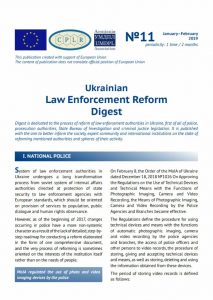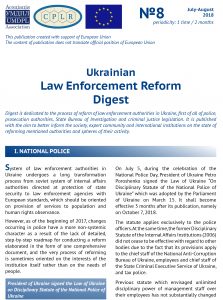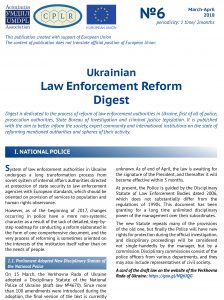Police reform is still listed among Ukraine’s most successful reforms undertaken since the Revolution of Dignity, but it shouldn’t be. In 2014-2015, it served as a showcase demonstrating Ukraine’s progress. To be fair, some results had been attained by that point: the newly reshuffled patrol police force was more transparent, it demonstrated zero tolerance for corruption, and it enjoyed unprecedented public support.
But “police reform” was only about patrol police, who account for less than one-tenth of the entire National Police—that is, 12,000 employees out of 140,000. The criminal police force, which investigates all general criminal offenses and is responsible for public safety, has never undertaken reform. Despite government promises that other vital departments of the National Police will undergo a reform as decisive and fast as that of the patrol police, it never happened. Notably, public trust of the patrol police has dropped from 55 percent in 2016 to 40 percent in 2018.
Meanwhile, an effective and fully operational criminal police force is more crucial now than ever. Ukraine is still one of the least safe countries in the world: it ranks 107 of 149 states, according to the Legatum Institute. Due to the country’s poor economic conditions, the war in the east, the unmonitored trade of unregistered firearms, and Russia’s continuous attempts to destabilize public security, the rate of armed crime has grown significantly.
The police are incapable of responding to these challenges. In the past two years, there have been a number of attacks on journalists, politicians, and civic activists that have never been properly investigated, despite high levels of public attention. According to the latest statistics, the national police solve as few as 34 percent of registered crimes. Moreover, victims are normally persuaded or even forced to not file complaints, while at the same time, the police fail to respond to victims’ calls, refuse to give people the right to see investigators in charge of their appeals, and ask for bribes to speed up investigations.
Additionally, the criminal police not only fail to perform their duties; they also vastly abuse their power. Torture, illegal arrests, and misconduct at peaceful protests remain the most common police abuses. Regrettably, fewer than 100 of these cases are investigated annually, and fewer than thirty per year end in convictions.
It is fair to say that Ukrainians, de facto, live without police protection. This leads to a decreased level of public security, increased social tensions, and a perceived lack of justice. Statistics show that citizens resort to calling the police mainly in cases of serious violent crime.
Nevertheless, despite the urgency of the matter, reform of the National Police is no longer a priority, and there is no single government platform to unite efforts around it. This is explained by a lack not only of political will, but also of strategic vision and a specific plan for what police reform should look like.
“Effective Strategy on Interior Ministry Reform Until 2020” issued in November 2017 is a purely declarative document failing to include deadlines, key performance indicators, or responsible officials; moreover, the action plan it references that was due by February 15 has never been developed.
As experts rightly admit, the lack of a high-level advocate for reform leads to sporadic actions and turns it into a battlefield of different political forces. Despite some gains in this area often cited by the government, the law enforcement system, including the National Police, is not only unreformed, but opposes attempts to address its systemic problems. Continue reading “One Overlooked Issue That Ukraine’s Political Parties Should Seize Now” →
 Ukrainian Law Enforcement Reform Digest. Issue 11: January-February. – Kyiv: Association UMDPL, CPLR, 2019. – 8 pages.
Ukrainian Law Enforcement Reform Digest. Issue 11: January-February. – Kyiv: Association UMDPL, CPLR, 2019. – 8 pages.
 Ukrainian Law Enforcement Reform Digest. Issue 8: July-August 2018. – Kyiv: Association UMDPL, CPLR, 2018. – 8 pages.
Ukrainian Law Enforcement Reform Digest. Issue 8: July-August 2018. – Kyiv: Association UMDPL, CPLR, 2018. – 8 pages.
 Ukrainian Law Enforcement Reform Digest. Issue 6: March-April 2018. – Kyiv: Association UMDPL, CPLR, 2018. – 8 pages.
Ukrainian Law Enforcement Reform Digest. Issue 6: March-April 2018. – Kyiv: Association UMDPL, CPLR, 2018. – 8 pages.